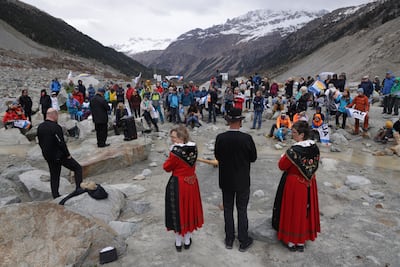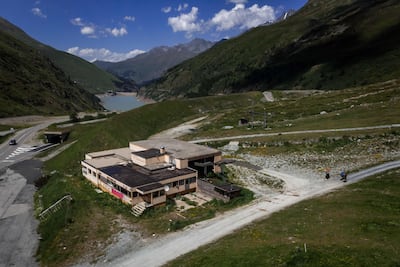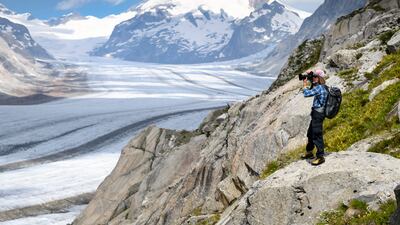Swiss voters will decide on Sunday whether the Alpine country whose idyllic mountain landscape is threatened by floods and melting glaciers will commit to fighting climate change by aiming for carbon neutrality in 2050.
Ministers are offering more than two billion Swiss francs ($2.2 billion) in subsidies as they urge people to back a shift towards heat pumps, renewable energy and underground carbon storage.
Parliament voted the measures through last year but opponents have gathered enough signatures to force a referendum under Switzerland’s system of direct democracy.
A previous attempt to chart a path to net zero ended in failure in 2021 when a majority of voters rejected a go-green package that included levies on flights and CO2 emissions.
The revised plan contains no new taxes. It also stops short of an outright ban on fossil fuels beyond 2050, as had been sought by a so-called Glacier Initiative.
But it aims to move away from fossil fuel imports that Switzerland relies on for heating and transport, despite generating most of its electricity from hydroelectric plants.
A 'yes' vote on Sunday would set emissions targets for the heating, transport and industrial sectors and formally write the 2050 target into law.
It offers subsidies for heat pumps and incentives for private companies to adopt their own green plans.
However, ministers have assured the public that tougher measures such as limits on domestic flights – a move already made in France – would be subject to a further referendum in Switzerland.

Switzerland is estimated to have warmed twice as fast as the global average, with temperatures already 2.5°C higher than in the 19th century.
The government says a switch away from fossil fuels will also make the country less dependent on exporters such as Russia, which has in the recent past provided about half of the country’s gas.
Polls have shown the net zero camp in the lead, but the margin has narrowed, and climate activists are concerned about low turnout in Sunday’s vote.
“Switzerland currently trails behind its neighbours in climate action,” said Balthasar Glaettli, the president of the Swiss Green party.
“A yes vote on the climate law will help us to catch up by setting concrete goals and developing innovative solutions. It will also inspire other countries. Together we will make progress.”
Opposing the net zero drive is the right-wing Swiss People’s Party (SVP), which calls it the “electricity eater” and argues the switch will be expensive and damage Switzerland’s energy security.
It has sought to associate the law with the “radical circles” of climate activists who have glued themselves to streets and blocked traffic
“This law will cost the public hundreds of millions of francs and threaten jobs and prosperity in our country, especially in rural areas,” said Hannes Germann, a member of Switzerland’s upper house.

Record winter temperatures in Switzerland underlined the threat of global warming, with parts of the mountains welcoming the new year with 20°C weather on January 1.
Several Alpine ski resorts were shut due to a lack of snow across the mountain range, a problem which also affected French slopes in the Pyrenees.
Switzerland says 2022 was its warmest and sunniest year ever and that days of 30°C or more are already two to four times more common than in 1960.
The country’s mountain glaciers are estimated to have shrunk by almost a third in the past four decades and by 60 per cent since 1850.
It leaves Switzerland facing the threat of flooding, as winter snowfall turns to water, but also drought, as smaller glaciers provide too little summer meltwater to fill reservoirs.
As well as mapping a route to net zero, the new law would task authorities with preparing for life on a warmer planet and dealing with floods, heatwaves, droughts, rockfalls and landslides that may no longer be stopped.
“Even as the world makes efforts to fight climate change, such effects may not be avoidable,” said Albert Roesti, a member of Switzerland’s ruling council responsible for the environment.


